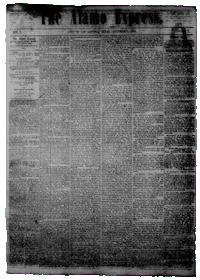April 10, 1861, Tri-Weekly Alamo Express (San Antonio)
The People Moving!
Col. Robt. Taylor’s Speech.
The following modest notice was posted about our city on Tuesday morning:
Public Meeting.
public meeting of all those in favor of preserving our government from total destruction, and restoring harmony and prosperity to our distracted country, will be held on the Main Plaza, Tuesday night the 9th inst., at 8 o’clock.
All say there was evident excitement and much talk upon the corners and about the streets. The court-house clique were busy caucusing among the people and prominent citizens, attempting to persuade them that it would not do to have a meeting,–that there would be excitement and trouble. But there was no use talking, night came, and the people poured into the Main Plaza from all parts of the city, and long before the time appointed there were at least a thousand upon the ground. They came as a free people, as they had been wont to do in time past, to meet together to talk over their affairs and listen to what had to be said–they came as a people who were not to be bullied or frightened from assembling in public meeting–they came not to the attractions of a sumptuous feast or a long list of prominent names, but as THE PEOPLE responding spontaneously to a call, which embraced in its terms something dearer than life–liberty, and their country’s welfare–they came as a people who have been reviled and misrepresented abroad and at home by a miserable clique and who had become somewhat uneasy about the liberty of speech.
A brilliant bonfire lighted up the plaza and a brass band kept the impatient people entertained until the time of speaking arrived by discoursing national airs. The balconies of the Plaza House and the buildings around the square were crowded with ladies and the whole scene was that of life and enthusiasm.
But it was impossible to keep so large and impatient an assemblage quiet long; they cheered for the Union and the American flag and upon Judge Paschal appearing among the spectators upon the balcony of the hotel, he was loudly called for, he responded in a few words excusing himself and mentioning that Col. Rob’t. Taylor from Fanin was expected to speak and he was satisfied the people would be fully gratified with the Colonel’s speech; Col. Taylor was then called for, who not being upon the ground at the moment arrived shortly afterwards and took the stand amidst three hearty cheers.
We are unable to give any extended idea of Col. Taylor’s speech not having taken any notes, but it was just such a speech as Col. Robt. Taylor can make; full of sound, practical sense, eloquence, moderation and patriotism. He alluded to his former visits to our city; in ‘44 when we were threatened with invasion from Mexico, in ‘46, on his way to Mexico to assist in maintaining the rights of Texas under the stars and stripes, [a small American flag floated near him on the stand] in ‘49 when the cholera swept our people into the grave yards, and a year since when the din of business was deafening–our streets were blockaded with building material and trains of carts and wagons ladened with merchandice, and the sound of the stone mason’s hammer way every where heard; he now witnessed commercial distress and our thirfty city desolated–and why? had we made less crops than usual? no pestilence raged. Then why was it? because public confidence had been destroyed in consequence of the breaking up of our government. Better far, he said, that the cholera raged, for the dead tell no tales.
Col. Taylor went over an extensive field of argument tracing this disunion matter back many years and showing that slavery was not the cause, but the lever that had been used to precipitate the people into revolution. He denounced in unmeasured terms the usurpations of the convention and alluded in a feeling manner to Gen. Houston. He counseled moderation and obedience to the laws, and if our Government became oppressive that we could exercise the right of changing it at the ballot box. His main point was “reconstruction” of the Union upon the failure of the Southern Confederacy to give us a good or better government than we had broken loose from. He pledged the people amongst whom he lived as the first who would gladly raise the standard of reconstruction.
The gallant Colonel’s speech was listened to with profound attention in spite of a few futile efforts to create a disturbance, and he was cheered with the greatest enthusiasm throughout.
After Col. T. was through, Judge Paschal was called for with such a vim that he was forced to take the stand, which he did, with simply the intention of saying a few words in excuse or explanation of his position, when a few persons, who, no doubt had been cut to the quick by Col. T’s speech began to call for someone else, this created so much noise that it was impossible for the Judge to be heard. Some miscreant, however, taking advantage of the night, was herd to say “abolitionist,” which was to much for the Judge’s good temper–he denounced the utterer in unmeasured terms, and who, had he been of sufficient courage, would have shown himself.
The band struck up Yankee Doodle and the people dispersed to their homes full of enthusiasm. A large number of the assemblage proceded to Judge Paschal’s residence, where he responded to their call in a short and eloquent speech.
So ended a glorious night. We have given the “reconstruction” ball a roll–let it be kept rolling over the state until all opposition is crushed out.
